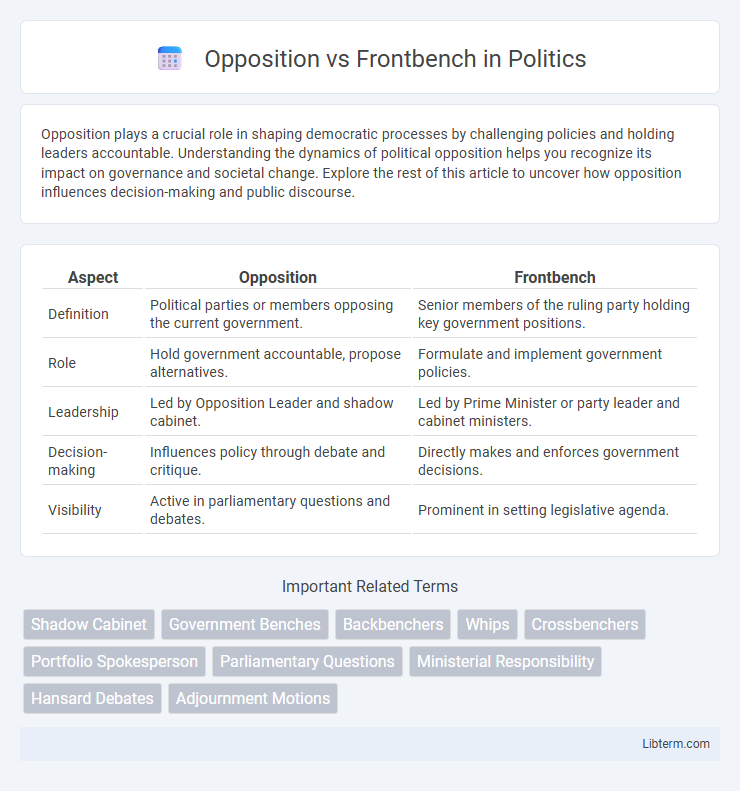Opposition plays a crucial role in shaping democratic processes by challenging policies and holding leaders accountable. Understanding the dynamics of political opposition helps you recognize its impact on governance and societal change. Explore the rest of this article to uncover how opposition influences decision-making and public discourse.
Table of Comparison
| Aspect | Opposition | Frontbench |
|---|---|---|
| Definition | Political parties or members opposing the current government. | Senior members of the ruling party holding key government positions. |
| Role | Hold government accountable, propose alternatives. | Formulate and implement government policies. |
| Leadership | Led by Opposition Leader and shadow cabinet. | Led by Prime Minister or party leader and cabinet ministers. |
| Decision-making | Influences policy through debate and critique. | Directly makes and enforces government decisions. |
| Visibility | Active in parliamentary questions and debates. | Prominent in setting legislative agenda. |
Understanding the Concept: Opposition vs Frontbench
The Opposition refers to the political party or coalition not currently in government, tasked with scrutinizing and challenging government policies. Frontbench members, or frontbenchers, are senior politicians in both the government and opposition who hold official portfolios or shadow portfolios, leading specific policy areas. Understanding the distinction highlights the Opposition's role in holding the government accountable, while frontbenchers drive policy development and parliamentary debate within their respective parties.
Historical Evolution of Parliamentary Roles
The historical evolution of parliamentary roles has shaped the distinct functions of the Opposition and Frontbench in modern legislatures. The Opposition emerged as a formalized entity in the 18th century British Parliament, serving as a critical check on government power and fostering political debate. Frontbenchers, originally recognized in the early 19th century, represent senior party members who lead policy discussions and hold ministerial or shadow ministerial positions, reinforcing structured party leadership within parliamentary systems.
Composition of the Opposition Bench
The Opposition bench in parliamentary systems primarily consists of senior members and shadow ministers representing the largest political party not in government. This composition includes experienced legislators tasked with scrutinizing government policies and proposing alternative solutions, thereby holding the ruling party accountable. The arrangement fosters a structured debate environment, ensuring diverse perspectives within the political spectrum are effectively represented.
Structure and Functions of the Frontbench
The frontbench in parliamentary systems consists of senior members of the governing party or coalition who hold official positions such as ministers or spokespersons, responsible for leading specific government departments or policy areas. They play a critical role in shaping legislation, presenting government policies, and managing parliamentary debates. Their structure often mirrors the government's cabinet, ensuring organized and coordinated responses to opposition challenges during sessions.
Key Responsibilities of the Opposition
The key responsibilities of the Opposition include scrutinizing government policies, holding the ruling party accountable, and presenting alternative policies to influence legislation. Opposition members analyze proposed laws, question government decisions during debates, and ensure transparency through parliamentary committees. Their role is crucial in maintaining a balanced democratic process by representing diverse public interests and fostering constructive political dialogue.
Leadership and Spokespeople: Who Sits Where?
Opposition leadership typically sits opposite the government frontbench to directly challenge ministers and present alternative policies. Frontbench members include senior party leaders and designated spokespeople responsible for specific policy areas, while backbenchers sit further away. The physical seating arrangement in parliamentary chambers visually distinguishes leadership roles and their corresponding spokespeople, highlighting political responsibilities and party hierarchy.
Frontbench Policies and Government Agenda
Frontbench policies represent the official stance and strategic priorities set by the government's leading ministers, shaping legislative agendas and public service delivery. These policies often focus on key sectors such as healthcare, economy, education, and national security to implement the government's commitments effectively. The government agenda reflects a coordinated effort to address socio-economic challenges, drive reform, and fulfill electoral promises through targeted legislation and resource allocation.
Parliamentary Debates: Opposition vs Frontbench Dynamics
In parliamentary debates, the opposition plays a critical role by challenging government policies and holding the frontbench to account through rigorous questioning and critique. Frontbench members, consisting of ministers and shadow ministers, lead their respective sides by articulating policy positions and responding strategically to opposition arguments. This dynamic fosters a vibrant legislative environment where policy ideas are scrutinized and government accountability is maintained.
Influence on Legislation and Decision-Making
The Opposition plays a crucial role in scrutinizing government proposals, challenging legislation, and influencing decision-making through debates and committee participation. Frontbench members, both from the ruling party and Opposition, hold specific portfolios enabling them to shape policy agendas and guide legislative priorities effectively. Their expertise and leadership within parliamentary groups significantly impact the formulation, amendment, and passage of laws.
The Impact on Democratic Accountability
The Opposition and Frontbench play distinct roles in enhancing democratic accountability by scrutinizing government policies and decisions through rigorous debate and questioning. The Frontbench, comprising government ministers, drives policy implementation, while the Opposition Frontbench offers alternative policies and holds ministers accountable through parliamentary procedures. Effective engagement between these entities ensures transparency, prevents abuse of power, and strengthens the legislative process within a democratic system.
Opposition Infographic

 libterm.com
libterm.com